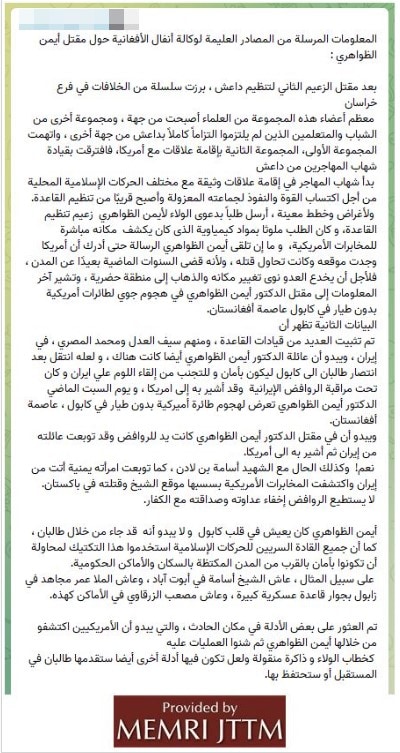The following report is now a complimentary offering from MEMRI's Jihad and Terrorism Threat Monitor (JTTM). For JTTM subscription information, click here.
"Afghan Anfal Agency," a Telegram channel which disseminates news of the Islamic Emirate of Afghanistan (the ruling Taliban jihadi organization), published an article claiming the leader of the Islamic State (ISIS) in Khorasan or Iran tipped off the U.S. military about the location of Al-Qaeda's leader Ayman Al-Zawahiri, who was killed in a U.S. done strike in Kabul, Afghanistan on July 31.
On August 6, 2022, the channel reported that it obtained "reliable information from well-informed sources" regarding the killing of Al-Zawahiri.
The next day, August 7, the channel posted an article identifying the alleged circumstances and the parties involved in revealing Al-Zawahiri's location to the U.S., which lead the drone operation that killed him.[1]

ISIS In Khorasan Experienced Internal Rifts Following Al-Qurayshi's Killing
"Well-informed sources," allegedly claimed that ISIS in Khorasan has been experiencing mounting disagreement between its affiliates, following the killing of ISIS's second Caliph, Abu Ibrahim Al-Hashemi Al-Qurayshi in a U.S. airborne operation north of Idlib, Syria on February 3, 2022.[2]
Discussing the ramification of this alleged internal dispute among group members, the channel wrote: "Most scholars in the group remained together, while the younger members and the educated ones, who did not adhere fully to Daesh [a pejorative term for ISIS], assembled on the opposite side. The first party accused the latter of establishing ties with the U.S., leading to a splinter faction led by Shihab Al-Muhajir."
ISIS Leader In Khorasan Established Ties With Al-Zawahiri, Sent Him Letter "Contaminated With Chemicals" To Discover His Location
The channel contended that after abandoning ISIS in Khorasan, Al-Muhajir began to build strong relationships with various local jihadi groups in an attempt to gain power and influence, noting that his efforts were fruitful, as he "became close to Al-Qaeda."
"To advance specific purposes and plans, Al-Muhajir sent a letter to Al-Qaeda leader Al-Zawahiri requesting to pledge allegiance. The letter was contaminated with chemicals that made Al-Zawahiri's location known to the CIA," the article argued.

Al-Zawahiri Moved To Kabul To "Deceive The Enemy"
According to the article, once Al-Zawahiri received the "contaminated letter" sent to him by Al-Muhajir, he realized his location was exposed to the U.S., which will move to kill him. He then relocated to an urban area, said the article. Noting that Al-Zawahiri had been living far from urban areas for a long time, the channel argued that his choice to move to Kabul was meant to "deceive the enemy."
Iran Knew Al-Zawahiri's Location
Discussing Iran's potential role in Al-Zawahiri's death, the channel indicated that "several Al-Qaeda leaders, such as Sayf Al-'Adl and Muhammad Al-Masri[3] had been instated in Iran," adding that Al-Zawahiri's family "seems to have lived there too."
The article claimed that Al-Zawahiri may have moved to Kabul following the Taliban's takeover to "feel safe and also to spare Iran the blame" for his presence there, noting that the "Rafidhite[4] Iran" has been monitoring his movement, as well as his family's itinerary, before his location was revealed to the Americans.
The article further argued that Iran was also involved in the killing of Osama bin Laden, because the CIA tracked his Yemeni wife after she left Iran and was able to identify his location in Pakistan. "The Rafidhites cannot hide their enmity [for the Sunnis] and their friendship with the unbelievers," it noted.
Taliban Involvement In Al-Zawahiri's Move To Kabul Is 'Unlikely'
Defending the Afghan Taliban against accusation that they knew Al-Zawahiri's location and helped hide him, the article said it is "unlikely" that the Taliban knew of his location in Kabul, saying that moving to urban areas has been a tactic used by many underground leaders.
[1] Twitter, August 4, 2022.
[2] See MEMRI JTTM Report: In Statement By New Islamic State (ISIS) Spokesman Abu Omar Al-Muhajir, Group Confirms Killing Of Leader Abu Ibrahim Al-Qurayshi And Spokesman Abu Hamza Al-Qurayshi, Announces Abu Al-Hassan Al-Hashimi Al-Qurayshi As New Leader, March 10, 2022.
[3] See MEMRI JTTM analysis report: Following Reported Death In Drone Strike Of Al-Qaeda Leader Ayman Al-Zawahiri – Exclusive MEMRI Jihad And Terrorism Threat Monitor (JTTM) Analysis Of Al-Qaeda's Remaining Leadership, July 20, 2022.
[4] Rejectionists, a derogatory term for Iraqi Shi'ites.
The full text of this post is available to subscribers.
Please login or register to request subscription information from MEMRI



